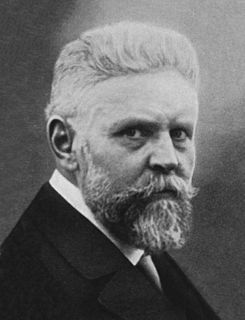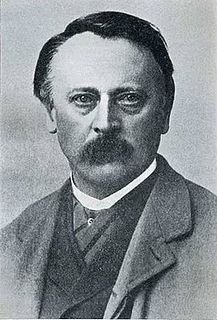
Medicine is the science and practice of establishing the diagnosis, prognosis, treatment, and prevention of disease. Medicine encompasses a variety of health care practices evolved to maintain and restore health by the prevention and treatment of illness. Contemporary medicine applies biomedical sciences, biomedical research, genetics, and medical technology to diagnose, treat, and prevent injury and disease, typically through pharmaceuticals or surgery, but also through therapies as diverse as psychotherapy, external splints and traction, medical devices, biologics, and ionizing radiation, amongst others.

Paracelsus, born Theophrastus von Hohenheim, was a Swiss physician, alchemist, and astrologer of the German Renaissance.

Alfred Ploetz was a German physician, biologist, eugenicist known for coining the term racial hygiene (Rassenhygiene) and promoting the concept in Germany. Rassenhygiene is a form of eugenics.

Franz Hartmann was a German medical doctor, theosophist, occultist, geomancer, astrologer, and author.
David Israel Macht was a pharmacologist and Doctor of Hebrew Literature, responsible for many contributions to pharmacology during the first half of the 20th century.

Nazi eugenics were Nazi Germany's racially based social policies that placed the biological improvement of the Aryan race or Germanic "Übermenschen" master race through eugenics at the center of Nazi ideology. In Germany, eugenics were mostly known under the synonymous term racial hygiene. Following the Second World War, both terms effectively vanished and were replaced by Humangenetik.
A Bioeffector is a viable microorganism or active natural compound which directly or indirectly affects plant performance (Biofertilizer), and thus has the potential to reduce fertilizer and pesticide use in crop production.
The Deutsche Gesellschaft für Pneumologie und Beatmungsmedizin is the largest and oldest medical professional organization for respiratory disorders in the German-speaking world and serves as a forum for all medical practitioners and scientists in the field of respiratory medicine. Almost 28% of the more than 3,000 members are women. Pneumologie has been the official journal of the German Respiratory Society since 1981.
Torsten Müller is an agricultural scientist at the University of Hohenheim. He is chairman of the examination and admissions board of the European Master´s Degree Course "Organic Agriculture and Food Systems" and Dean of Education of the Agricultural Science Faculty in Hohenheim.
Satyabrata Sarkar,, is a scientist, investigating physiological phenomena in plants and then studying the structure and function of plant-pathogenic viruses in the Max-Planck-Institute for Biology in Tuebingen and at the University of Hohenheim in Germany. Later on he was teaching Bengali language and literature in the Department of Indology of the University of Tuebingen.
Uwe Ludewig is a German agricultural scientist specialising in plant physiology. He is director of the Institute for Crop Science at the University of Hohenheim.
Ralf Thomas Voegele is a German Biologist, specialising in Microbiology. He is Professor of Phytopathology and Dean of the Agricultural Science Faculty at the University of Hohenheim.
Georg Friedrich Backhaus is a German agricultural scientist specializing in horticulture and phytomedicine. Since 2008 he has been president of the Julius Kühn-Institut (JKI) with headquarters in Quedlinburg.
Falko Feldmann is a German biologist and practitioner of phytomedicine. He is coordinator of matters concerning approval and registration of active substances and agents for plant protection, including international cooperation on questions about European Plant Protection Laws. He also holds the post of Director of the Deutschen Phytomedizinischen Gesellschaft e.V. and is involved in a number of organisations and committees relevant to plant protection.
Johannes Hallmann is a German agricultural scientist of phytomedicine. He is a scientific adviser at the Julius Kühn-Institut, the Federal Research Institute for Cultivated Plants, the Institute for Epidemiology and Pathogen Diagnostics in Münster, the University Professor for Nematology and the President of the German Phytomedicine Society.
Juergen Zeddies is a German agricultural economist, Emeritus of the University of Hohenheim and an advisor to German and international governments and research organisations.
Markus Weinmann is an agricultural scientist specialising in the area of Plant Physiology at the University of Hohenheim, and ranks as one of the pioneers of Bioeffector-Research aimed at improving plant growth, vitality and disease resistance. He is also coordinator of field experiments in the EU-Biofector-Project.
The European Scientific Cooperative on Phytotherapy (ESCOP) was founded in 1989 as an umbrella organisation, representing national European phytotherapy associations. Associations in non-EU states can also be members of ESCOP.





